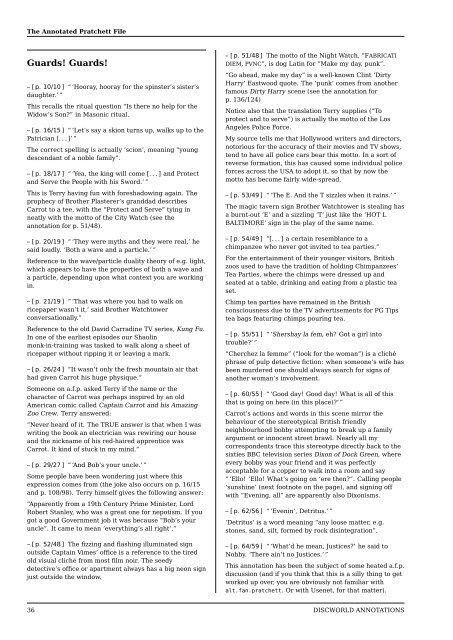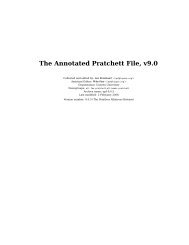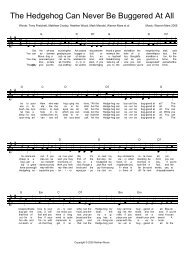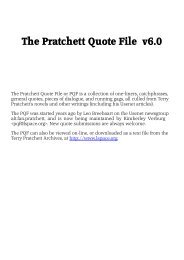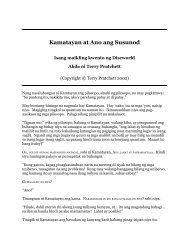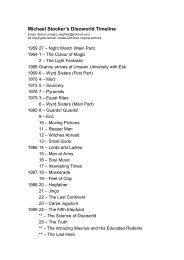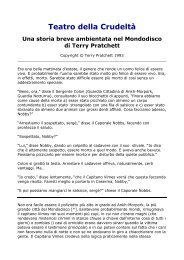The Annotated Pratchett File, v9.0 - The L-Space Web
The Annotated Pratchett File, v9.0 - The L-Space Web
The Annotated Pratchett File, v9.0 - The L-Space Web
You also want an ePaper? Increase the reach of your titles
YUMPU automatically turns print PDFs into web optimized ePapers that Google loves.
<strong>The</strong> <strong>Annotated</strong> <strong>Pratchett</strong> <strong>File</strong><br />
Guards! Guards!<br />
– [ p. 10/10 ] “ ‘Hooray, hooray for the spinster’s sister’s<br />
daughter.’ ”<br />
This recalls the ritual question “Is there no help for the<br />
Widow’s Son” in Masonic ritual.<br />
– [ p. 16/15 ] “ ‘Let’s say a skion turns up, walks up to the<br />
Patrician [. . . ]’ ”<br />
<strong>The</strong> correct spelling is actually ‘scion’, meaning “young<br />
descendant of a noble family”.<br />
– [ p. 18/17 ] “ ‘Yea, the king will come [. . . ] and Protect<br />
and Serve the People with his Sword.’ ”<br />
This is Terry having fun with foreshadowing again. <strong>The</strong><br />
prophecy of Brother Plasterer’s granddad describes<br />
Carrot to a tee, with the “Protect and Serve” tying in<br />
neatly with the motto of the City Watch (see the<br />
annotation for p. 51/48).<br />
– [ p. 20/19 ] “ ‘<strong>The</strong>y were myths and they were real,’ he<br />
said loudly. ‘Both a wave and a particle.’ ”<br />
Reference to the wave/particle duality theory of e.g. light,<br />
which appears to have the properties of both a wave and<br />
a particle, depending upon what context you are working<br />
in.<br />
– [ p. 21/19 ] “ ‘That was where you had to walk on<br />
ricepaper wasn’t it,’ said Brother Watchtower<br />
conversationally.”<br />
Reference to the old David Carradine TV series, Kung Fu.<br />
In one of the earliest episodes our Shaolin<br />
monk-in-training was tasked to walk along a sheet of<br />
ricepaper without ripping it or leaving a mark.<br />
– [ p. 26/24 ] “It wasn’t only the fresh mountain air that<br />
had given Carrot his huge physique.”<br />
Someone on a.f.p. asked Terry if the name or the<br />
character of Carrot was perhaps inspired by an old<br />
American comic called Captain Carrot and his Amazing<br />
Zoo Crew. Terry answered:<br />
“Never heard of it. <strong>The</strong> TRUE answer is that when I was<br />
writing the book an electrician was rewiring our house<br />
and the nickname of his red-haired apprentice was<br />
Carrot. It kind of stuck in my mind.”<br />
– [ p. 29/27 ] “ ‘And Bob’s your uncle.’ ”<br />
Some people have been wondering just where this<br />
expression comes from (the joke also occurs on p. 16/15<br />
and p. 108/98). Terry himself gives the following answer:<br />
“Apparently from a 19th Century Prime Minister, Lord<br />
Robert Stanley, who was a great one for nepotism. If you<br />
got a good Government job it was because “Bob’s your<br />
uncle”. It came to mean ‘everything’s all right’.”<br />
– [ p. 52/48 ] <strong>The</strong> fizzing and flashing illuminated sign<br />
outside Captain Vimes’ office is a reference to the tired<br />
old visual cliché from most film noir. <strong>The</strong> seedy<br />
detective’s office or apartment always has a big neon sign<br />
just outside the window.<br />
– [ p. 51/48 ] <strong>The</strong> motto of the Night Watch, “FABRICATI<br />
DIEM, PVNC”, is dog Latin for “Make my day, punk”.<br />
“Go ahead, make my day” is a well-known Clint ‘Dirty<br />
Harry’ Eastwood quote. <strong>The</strong> ‘punk’ comes from another<br />
famous Dirty Harry scene (see the annotation for<br />
p. 136/124)<br />
Notice also that the translation Terry supplies (“To<br />
protect and to serve”) is actually the motto of the Los<br />
Angeles Police Force.<br />
My source tells me that Hollywood writers and directors,<br />
notorious for the accuracy of their movies and TV shows,<br />
tend to have all police cars bear this motto. In a sort of<br />
reverse formation, this has caused some individual police<br />
forces across the USA to adopt it, so that by now the<br />
motto has become fairly wide-spread.<br />
– [ p. 53/49 ] “ ‘<strong>The</strong> E. And the T sizzles when it rains.’ ”<br />
<strong>The</strong> magic tavern sign Brother Watchtower is stealing has<br />
a burnt-out ‘E’ and a sizzling ‘T’ just like the ‘HOT L<br />
BALTIMORE’ sign in the play of the same name.<br />
– [ p. 54/49 ] “[. . . ] a certain resemblance to a<br />
chimpanzee who never got invited to tea parties.”<br />
For the entertainment of their younger visitors, British<br />
zoos used to have the tradition of holding Chimpanzees’<br />
Tea Parties, where the chimps were dressed up and<br />
seated at a table, drinking and eating from a plastic tea<br />
set.<br />
Chimp tea parties have remained in the British<br />
consciousness due to the TV advertisements for PG Tips<br />
tea bags featuring chimps pouring tea.<br />
– [ p. 55/51 ] “ ‘Shershay la fem, eh Got a girl into<br />
trouble’ ”<br />
“Cherchez la femme” (“look for the woman”) is a cliché<br />
phrase of pulp detective fiction: when someone’s wife has<br />
been murdered one should always search for signs of<br />
another woman’s involvement.<br />
– [ p. 60/55 ] “ ‘Good day! Good day! What is all of this<br />
that is going on here (in this place)’ ”<br />
Carrot’s actions and words in this scene mirror the<br />
behaviour of the stereotypical British friendly<br />
neighbourhood bobby attempting to break up a family<br />
argument or innocent street brawl. Nearly all my<br />
correspondents trace this stereotype directly back to the<br />
sixties BBC television series Dixon of Dock Green, where<br />
every bobby was your friend and it was perfectly<br />
acceptable for a copper to walk into a room and say<br />
“ ‘Ello! ‘Ello! What’s going on ‘ere then”. Calling people<br />
‘sunshine’ (next footnote on the page), and signing off<br />
with “Evening, all” are apparently also Dixonisms.<br />
– [ p. 62/56 ] “ ‘Evenin’, Detritus.’ ”<br />
‘Detritus’ is a word meaning “any loose matter, e.g.<br />
stones, sand, silt, formed by rock disintegration”.<br />
– [ p. 64/59 ] “ ‘What’d he mean, Justices’ he said to<br />
Nobby. ‘<strong>The</strong>re ain’t no Justices.’ ”<br />
This annotation has been the subject of some heated a.f.p.<br />
discussion (and if you think that this is a silly thing to get<br />
worked up over, you are obviously not familiar with<br />
alt.fan.pratchett. Or with Usenet, for that matter).<br />
36 DISCWORLD ANNOTATIONS


